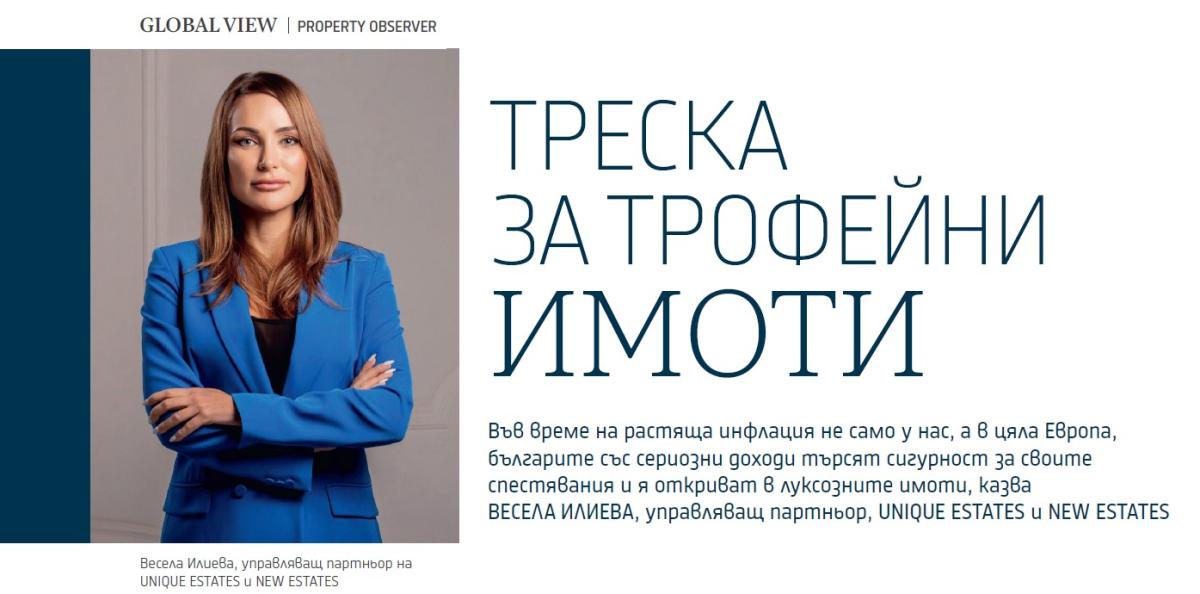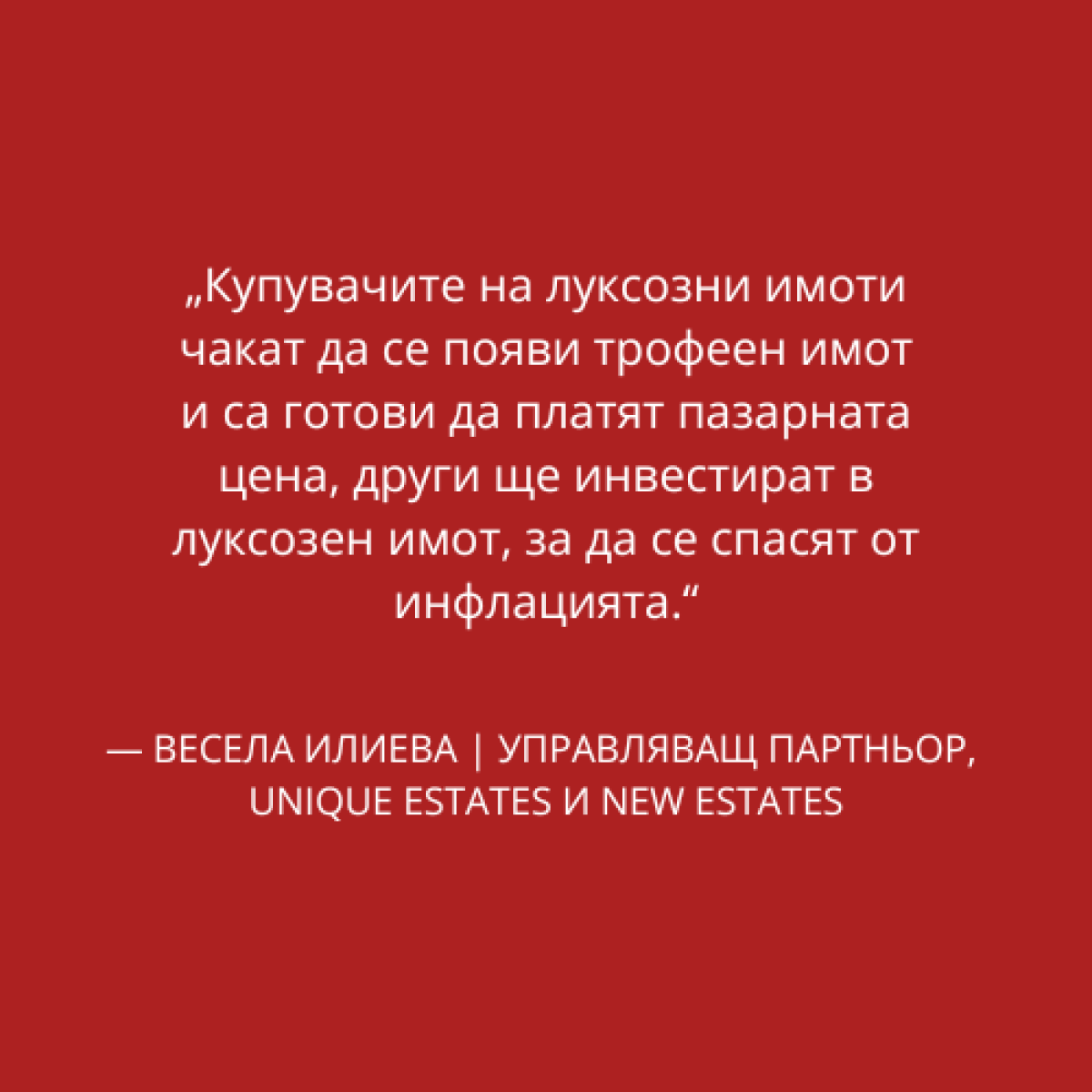


After more than a decade of steady economic growth, many Bulgarians have enviable savings. But even when they have the necessary funds, they are surprised to discover that buying a house in Downtown Sofia is not easy and far from a snap of the fingers. The situation on the global map - the war in Ukraine, the geopolitical turbulence around China, all these seemingly external factors are putting serious pressure on available prime housing and keeping sellers' motivation close to zero.
We talk to Ms. Vesela Ilieva about trends in the property market, the behaviour of high-income consumers, the growth of wealth, the impact of rising interest rates and fears of a housing bubble.
VESELA ILIYEVA, Managing Partner of Unique Estates and New Estates, reveals the opportunities in the dynamic property market. "It is in a market like this, when buyers are 30% down on 2021 and we have a slowdown, that so-called trophy properties are coming on the market - sellers are having second thoughts, deciding to sell, and properties with real conquest value are coming on the market," she says. "At the same time, in this market, buyers with existing savings are ready to buy immediately. I don't think we are at a point of stress in the luxury property market. Even when paying an extraordinary price, buyers do not feel anxiety, says Ms Ilieva. The market is very interesting, and we have experienced it other times."
Let's start by analyzing the bigger picture. Wealth in the world is steadily growing. Contrary to expectations, the C20-19 and water crises have negatively impacted wealth, but they have proven to be a form of catalyst. Thus, in the midst of the biggest shocks to the global economy that we have witnessed, the value of wealth - the sum of assets in the form of stocks, bonds, real estate, savings in the banking system - is increasing. This global trend is not bypassing Bulgaria. This means very strong purchasing power, but in a global world where everyone can choose whether to spend their money in Bulgaria, France or Dubai.
Supply and demand is based on how rich people feel, but also what perspective they feel they have. In 2021 they started to get their confidence back, after the shock they gradually calmed down about the risks of war. They continued to work actively, and inflation helped them become even richer. These are the statistics - the net financial assets of Bulgarians are growing by nearly 5% in 2022 and this clearly shows us the trend of development. People want to invest their money in luxury assets because they do not lose their value in a crisis and the experience of 2009 proves it. That is why the prices of these assets have been rising over the last two years at a serious pace, with the old psychological limit of EUR 1 million for a luxury apartment having been crossed, and in the trophy property category we are getting closer and closer to EUR 1.5 million.
Nothing in the fundamentals of the luxury real estate market indicates anything approaching a bubble condition. First, bubbles require people to buy not because they need or want to, but because the collective consciousness believes prices can only go up. We are not even close to that stage. Buyers may think they are paying too much, but they don't consider it a problem if they need a bigger house or have stumbled upon a long-desired unique property. Secondly, the bubble requires a large amount of borrowed capital. When people use too much money on credit, bankruptcy problems can arise. But the situation in 2023 is not what it was in 2006, 2007 - a boom that turned into a bust. Even then, luxury real estate suffered the least, but the numbers now show that people have a lot more money earned and saved.
Perhaps for the first time wealthier buyers are in this situation - they have money and don't know what to invest it in. This is especially true for consumers who are risk averse and risk averse. They literally have no alternative - they have to leave their money in the bank, where inflation is eating it up, or find a trophy property to save it in. But the supply problem is serious. Elite property owners are in the same situation. They have no motivation to sell because "what to do with the money freed up from the deal". In practice, today having the money is far from enough to get the dream house in the center of Sofia. Luxury properties are not mass market properties, they are the safest properties in a market. They are few in number and everyone wants them. When the demand is more than the supply, there is no reason to have a disruption in this market.
Prices are stable and we expect them to rise smoothly, but there is no reason to expect a decline - especially for trophy properties. Buyers with cash will buy. Those relying on credit will go rental. We will continue to have a shortage of older homes and will set our sights on new construction projects - luxury gated communities that will be increasingly attractive.
There are serious steps by the European Central Bank to put the brakes on inflation. But most experts believe that the general economic situation does not suggest a big increase will pile up in the long run. I don't think the interest rate picture in this country will change dramatically in the next 12 months.
A clear trend in recent years is Bulgarians looking for a holiday property. Not only on the sea, but also in the mountain and spa resorts. For many people it no longer matters where they are located to do their job successfully, and this has led to the escalation of second home purchases.
One of the expected consequences of the series of crises is the demand for security. People in Bulgaria continue to be conservative about property and investments. Although a whole new generation of buyers is coming to the market, their behaviour is not significantly different from that of their parents. Thus, the belief that property is the only safe investment remains and the only salvation against rising inflation is having an impact on the market.